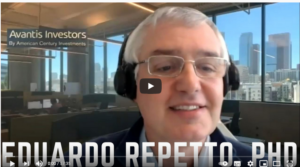
Over the years, I’ve encountered several financial advisors who liked to use the mutual funds of Dimensional Fund Advisors or DFA, which was founded by alumni of the University of Chicago and based on research on the long-term return premiums offered by small-cap and Value stocks around the world. Even today I own a DFA International Equity fund that was a legacy of my time with a fee-only advisor: that’s generally the requirement for accessing DFA funds.
So I was intrigued when certified financial planner Mike Bayer [CFP, CIM, FCSI) asked me to help him interview two senior executives of Avantis Investors (a unit of American Century Investments) which for the past 18 months has been marketing Avantis ETFs, which take a similar approach with small-cap and value factors and are more accessible to do-it-yourself investors who can buy the ETFs at discount brokerages, just like any other ETF.
Regular readers of the MoneySense ETF All-Stars may recognize the name Avantis. As you can see here, the Avantis US Small Cap ETF [AVUV] was a Desert Island pick of PWL Capital’s Ben Felix and Cameron Passmore. We are about to publish the 2021 edition and as mentioned in the video interview also linked below, that pick is back along with another Avantis selection, which you can learn by watching the video. In addition, Felix has just released a 15-minute video covering Avantis: https://youtu.be/
In the end, possibly influenced by the arrival of Avantis, DFA itself brought out three of its own ETFs: https://us.dimensional.com/etfs
Bios
Dr. Eduardo Repetto is Chief Investment Officer of Avantis Investors. Previously he was Co-Chief Executive Officer and Co-Chief Investment Officer of Dimensional Fund Advisors. He earned a Ph.D. degree in Aeronautics from the California Institute of Technology, an MSc degree in Engineering from Brown University, and a Diploma de Honor in Civil Engineering from the Universidad de Buenos Aires.
Phil McInnis is also a DFA alumnus, where he was Head of Portfolio Solutions. Today he is director of investments at Avantis Investors®, responsible for marketing content development surrounding Avantis’ investment approach.
Mike Bayer, CFP, CIM, FCSI, is a Toronto-based financial planner with Strategic Analysis Capital Management and blogger at Free Speech Media.
Highlights from the transcript
So without further ado, here is a link to the full interview, which runs almost an hour. However, you can click on a “transcript” link within YouTube, for those who prefer reading and skimming. Below are some highlights:
After the biographical introductions reprised above, I ask Eduardo about the Avantis small-cap funds mentioned above, but that part of the conversation is short because he doesn’t want to mention stock tickers for regulatory/compliance purposes. Then we get into the University of Chicago deep academic research about the Fama and French three-factor model.
Then we get into the current macroeconomic environment: the spectre of accelerating inflation and rising interest rates and discuss current popular Covid-related investing themes such as Stay-at-Home stocks and Covid recovery stocks. Then we cover off how investing in Small-cap and Value ETFs can help investors in the current volatile environment.
At one point, they make the fascinating point that some long-term investors are so convinced of the higher expected returns from small-cap value that a few with strong stomachs actually hold nothing but ETFs selecting those kind of stocks.
Expected returns from Stocks
But it’s clarified that the long term may have to be 15 years: even 10 years may not be sufficiently long to see this approach pay off.
Clearly these executives believe stocks are the asset class with the best chance of generating long-term investment returns and there is a discussion of those expected returns, and the long and circuitous route to achieving them. US stocks have on average returned 10% a year but they didn’t have enough long-term data to make definitive statements about Canadian stock returns.
Near the end, Mike Bayer asks about the latest SPIVA scorecard, which as usual shows how the vast majority of actively managed investment funds lag those tracking the broad passive stock indices. There ensues a discussion of the impact of fees on long-term investment returns and apparent exceptions to the trend — notably the celebrated Cathie Woods of ARK ETFs — and of ETF transparency as it relates to active and passive management.
Towards the end we ask about the lessons learned from DFA from Ken French and Eugene Fama and close with some parting remarks from both Eduardo and Phil.


